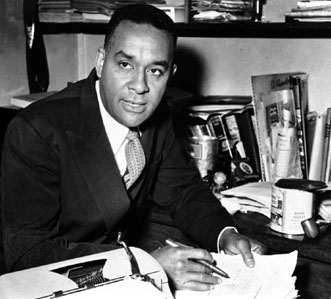
In the story Native Son , Richard Wright explores the struggle of racism and the role of African Americans in Chicago. The main character, Bigger, strives to shed the negative connotations of his skin and be an independent man. One way in which he is able to do this is through movies. Like many Chicago citizens, Bigger uses movies as a way to escape reality.

Chicagoans used this particular form or entertainment to resist the harsh
realizations of the grim city life. Their local
theatre provided them with a place to dream and become whatever they aspire.
When Bigger and his friends attend the movies, their interest automatically
sparks.
“Bigger sat looking at the first picture; it was a newsreel. As
the scenes unfolded his interest was caught and he leaned forward. He
saw images of smiling, dark-haired whit girls lolling on the gleaming sands
of a beach. The background was a stretch of sparkling water. Palm trees
stood near and far”(Wright 31).
These scenes provide a concrete picture to pair with
dreams of escape. For Bigger, watching the images unfold, he
is no longer a black man, but simply a man.
As the movie plays on, the images portrayed on the screen
become his reality. It turns out that one of the many provocative young girls in
the newsreel is his new employer’s daughter. It was then that
harsh realities set in and Bigger is again focused on the unfairness of his
life.
“Bigger turned his eyes to the screen, but he did not look. He
was filled with a sense of excitement about his new job. Was what he
had heard about rich white people really true? Was he going to work
for people like you saw in the movies? If he were, then he’d see
a lot of things from the inside; he’d get the dope, the low-down. He
looked at Trader Horn unfold and saw pictures of naked black men and women
whirling in wild dances and heard drums beating and then gradually the African
scene changed and was replaced by images in his own mind of white men and
women dressed in black and white clothes, laughing, talking, drinking and
dancing. Those were smart people; they knew how to get hold of money, millions
of it. Maybe if he were working for them something would happen and
he would get some of it. He would see just how they did it. Sure, it
was all a game and white people knew how to play it. And rich white
people were not so hard on Negroes; it was the poor whites who hated Negroes.
They hated Negroes because they didn’t have their share of the
money” (Wright 33).
For Bigger, the movies provided hope for the life that was to
come for him. From there, he was able to dream about the possibilities
that could come and change his life for the better.